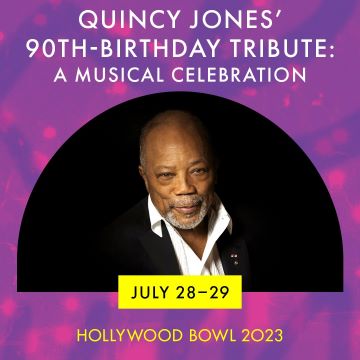JONESING FOR JONES
For two nights at the Hollywood Bowl, quite an all-star cast paid tribute to arranger-composer-producer Quincy Jones. His 90th birthday actually took place last March 14 but it was a good excuse to celebrate “the Dude’s” musical legacy.
Angélique Kidjo
Samara Joy, Patti Austin, Jacob Collier
Quincy Delight Jones Jr. was born in Chicago and grew up in Seattle. He took up the trumpet and as a teenager was a friend of Ray Charles (who was two years older). Jones worked with Lionel Hampton’s big band as a section trumpeter (Clifford Brown and Art Farmer got the solos) and arranger, touring Europe with Hampton in 1953 where he made some recordings, most notably as an arranger-composer. He freelanced in New York and was in the band that backed Elvis Presley on his first television appearances. Jones was a member of the globetrotting Dizzy Gillespie Orchestra during 1956-57 and then formed his own band to make records. He spent time in Europe where he was the music director of the Barclay label and in 1959-60 led his finest orchestra. The Quincy Jones Big Band toured Europe, playing great music but largely starving until they managed to make their way back to the States. In the 1960s Jones was vice-president of Mercury Records, began to write music for films (40 in all), composed the theme songs for many television shows, cut jazz-oriented records, and wrote arrangements for the likes of Count Basie, Frank Sinatra, Billy Eckstine, Ray Charles, Ella Fitzgerald, Peggy Lee, Sarah Vaughan and Dinah Washington among many others. Jones largely left jazz after the early 1970s although he later sponsored some young jazz artists, switching to R&B and pop as a producer and composer. He produced the soundtrack for The Wiz and worked with Michael Jackson throughout the 1980s including producing Thriller. Other accomplishments include working as the film producer for The Color Purple, organizing the recording of “We Are The World,” founding and running Qwest Entertainment, producing the television show The Fresh Prince Of Bel-Air, and getting Miles Davis to perform the music of Gil Evans at the 1991 Montreux Jazz Festival. Among his best-known compositions in the jazz world are “Stockholm Sweetnin’” “For Lena And Lennie,” and “The Midnight Sun Will Never Set.”
Chris Tucker
At the Bowl on Friday night, except for his connection with Michael Jackson, none of the information in the above paragraph was mentioned. No one explained why Quincy Jones’ birthday was worth celebrating or what most of his contributions to music have been. His jazz years were run through quickly and the second half of the night was essentially a tribute to Michael Jackson. Audience members might have wondered what the fuss about Quincy Jones was about. After all, no one bothered to mention that nearly all of the arrangements heard that night were by Jones.
Samara Joy and Larry Williams
Aloe Blacc
The Hollywood Bowl Orchestra conducted by Jules Buckley was essentially the concert’s house band and they were as brilliant and versatile as one would expect. The night began with pianist Alfredo Rodriguez being featured on “Soul Bossa Nova,” one of the few instrumentals of the evening. Samara Joy sounded wonderful on “Misty,” soaring above the strings on a Jones arrangement originally written for Sarah Vaughan. Larry Williams had a warm tenor solo and Ms. Joy showed off her wide range at the piece’s conclusion.
Patti Austin
John Legend
Aloe Blacc was fine on a swinging arrangement of “Fly Me to the Moon” (written for Frank Sinatra). Patti Austin sang quite well on the ballad “How Do You Keep the Music Playing?” and “Betcha Wouldn’t Hurt Me.” The latter had Stevie Wonder come out as a surprise guest, accompanying Austin on piano. Wonder, who actually told a story about Quincy Jones (few others did), excited the group during his feature on “You’ve Got It Bad Girl” including playing some harmonica. John Legend sang and played piano on the ballad “Just Once.” Trumpeter Ibrahim Maalouf mostly played it straight on “She’s Out of My Life.” Sheléa displayed a strong voice (with lots of screaming) on the R&Bish “You Put a Move on My Heart” while being backed by five background singers. The first half concluded with the Brothers Johnson’s hit “Stomp.”
Ibrahim Maalouf
Angélique Kidjo
While there had been a fair amount of variety, the second set was mostly one Michael Jackson hit after another, making one wonder what else Quincy Jones has been involved with during the past half-century. Angélique Kidjo sang and danced like Jackson during “Wanna Be Startin’ Somethin’,” Avery Wilson performed “Rock With You,” and Stevie Mackie displayed his very high falsetto voice on “Don’t Stop ‘Til You Get Enough.”
Jacob Collier and his mother, Suzie Collier
Stevie Mackie
The inventive singer and pianist Jacob Collier quieted things down a bit with a tasteful version of “Human Nature,” concluding with a humorous sing-along. Then it was back to rock as the BJ the Chicago Kid (aka Bryan James Sledge) sang “Billie Jean,” Vula Malinga performed “P.Y.T.,” Avery Wilson sang “Thriller,” and Siedah Garrett revived “Man in the Mirror.” The plot of the night, paying tribute to Quincy Jones, was long lost at this point.
Siedah Garrett
For “Let the Good Times Roll” (a Jones arrangement originally written for Ray Charles), Patti Austin, Samara Joy, Jacob Collier, Alfredo Rodriguez, and Ibrahim Maalouf returned to the stage but it was largely anti-climactic. The night ended with Stevie Wonder leading most of the night’s singers through his “Happy Birthday” in tribute to Quincy Jones. Unfortunately the honoree never did appear on stage although one hoped that he enjoyed the show.
photos by Timothy Norris/Los Angeles Philharmonic Association; taken on July 28, 2023


{ 1 comment… read it below or add one }
The music was excellent, but we were bitterly disappointed that the connections to Quincy were not consistently pointed out, and that Quincy didn’t step on stage to receive & acknowledge his accolades.